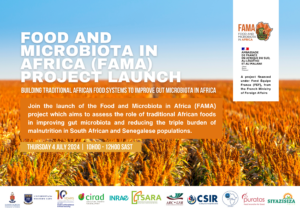Time: 10:00 - 12:00
Venue: Zoom
Building traditional African food systems to improve gut microbiota in Africa

Join us for the launch of the Food and Microbiota in Africa (FAMA) project, on Thursday 4 July.
The FAMA project, which is financed under Fond Équipe France, from the French Ministry of Foreign Affairs, aims to assess the role of traditional African foods in improving gut microbiota and reducing the triple burden of malnutrition in South African and Senegalese populations.
The long-term overall objective of the project is to build on traditional African foods as an alternative food system to reduce the triple burden of malnutrition and prevent NCDs in South Africa and Senegal. This long-term objective requires co-building evidence between African and European research partners on the interest of traditional African foods in improving gut microbiota. By the end of the project, food system actors will, therefore, have better knowledge and skills on the health benefits, as well as the environmental and socioeconomic benefits, of African traditional foods.
Register on Zoom: https://bit.ly/4ePXjvt
Programme
10h00: Hybrid session opens.
Welcome remarks and introduction of keynote speaker – Dr Arlène Alpha (CIRAD/CoE-FS)
10h05: Keynote address – Ambassador David Martinon, French Ambassador to South Africa
10h20: Address from the DSI-NRF Centre of Excellence in Food Security (CoE-FS) – Professor Lise Korsten, CoE-FS Co-director
10h30: Presentations, including:
- Linking consumption of traditional foods and gut microbiota
- Evaluating the effect of traditional foods on gut microbiota
- Accompanying innovations from farmers and processors of traditional foods
- Engaging with policymakers.
12h00: Hybrid session closes.
Register on Zoom: https://bit.ly/4ePXjvt
Upcoming Events
Our GOALS
We recognise that producers, processors, distributors and consumers are incorporated into the food system under varying terms and returns. We also recognise the economic, social, human and environmental health impacts associated with food security. Therefore our goal is to conduct research, build capacity and disseminate findings that will promote a sustainable food system in South Africa.
Our MISSION
Our research is concerned with the scale, nature, causes and consequences of food insecurity in South Africa and elsewhere on the African continent. Thus our mission is to investigate products, technologies, processes and policies that can reduce food insecurity and mitigate its negative outcomes. We seek to make a difference to food security by linking innovative science with critical enquiry.



